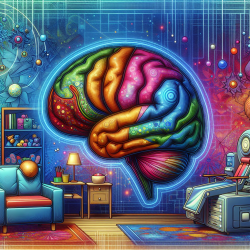Introduction
As practitioners in the field of speech-language pathology, our mission is to create the best outcomes for children. This often involves understanding complex neurological conditions and utilizing the latest research to inform our therapeutic approaches. One such condition is Schizotypal Personality Disorder (SPD), which shares many characteristics with schizophrenia. A recent review article, A Review of Structural MRI and Diffusion Tensor Imaging in Schizotypal Personality Disorder, provides valuable insights into the brain abnormalities associated with SPD. Here, we will explore how these findings can enhance our practice and encourage further research.
Understanding the Research
The review article examines 15 structural MRI studies and 3 Diffusion Tensor Imaging (DTI) studies focusing on SPD. These studies reveal that individuals with SPD exhibit temporal lobe abnormalities similar to those seen in schizophrenia, while the frontal lobe appears more spared. This pattern suggests that frontal lobe sparing may act as a neuroprotective factor, potentially suppressing psychosis.
The research groups MRI abnormalities in SPD into three patterns:
- Spectrum of Severity: Abnormalities are similar to those observed in schizophrenia but are less severe.
- Spectrum of Region: Abnormalities affect some, but not all, brain regions impacted by schizophrenia.
- Spectrum of Compensation: Abnormalities reflect greater-than-normal white matter volume, possibly serving as a compensatory mechanism.
Implications for Practitioners
Understanding these brain abnormalities can significantly impact our therapeutic approaches. Here are some practical ways to implement these findings:
- Tailored Interventions: Knowing that the temporal lobe is primarily affected in SPD, we can focus on language and social communication interventions that target this region.
- Monitoring Cognitive Functions: Given the frontal lobe's relative sparing, cognitive functions such as executive functioning and problem-solving may be less impaired. This allows us to leverage these strengths in therapy.
- Early Detection and Intervention: MRI and DTI can be used as diagnostic tools to identify SPD early, allowing for timely intervention and potentially better outcomes.
Encouraging Further Research
While the current research provides valuable insights, there is still much to learn. Here are some areas where further research is needed:
- Longitudinal Studies: More long-term studies are needed to understand how brain abnormalities in SPD evolve over time and how they impact cognitive and social functions.
- Comparative Studies: Direct comparisons between SPD and other conditions, such as autism and ADHD, can help differentiate the unique brain patterns associated with each disorder.
- Multimodal Imaging: Combining MRI and DTI with other imaging techniques, such as functional MRI (fMRI), can provide a more comprehensive understanding of brain function in SPD.
Conclusion
As practitioners dedicated to improving the lives of children, staying informed about the latest research is crucial. The findings from structural MRI and DTI studies in SPD offer valuable insights that can enhance our therapeutic approaches. By tailoring interventions, monitoring cognitive functions, and encouraging further research, we can make a significant impact on the lives of children with SPD.
To read the original research paper, please follow this link: A Review of Structural MRI and Diffusion Tensor Imaging in Schizotypal Personality Disorder.










